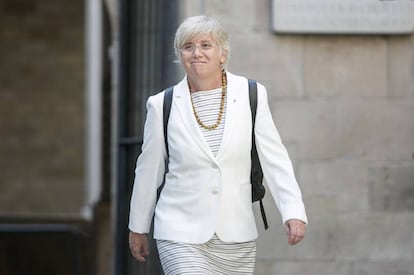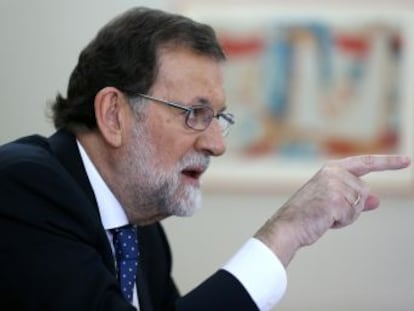The pro-independence activists of academia
A group of Catalan professors in the United States has spent years vigorously defending the idea of an independent Catalonia

Over the years, people have sought to legitimize Catalan independence not only in Europe, but also in the United States. They have accomplished this by taking advantage of the concept of self-determination that is popular in the United States and by drawing parallels to the secessionist origin of the first world power that came about after the colony’s armed revolt held 5,000 kilometers away from the mother country.
Catalan sovereignty has managed to garner support from Catalan academics and researchers located in strategic universities. Some Americans, such as Noam Chomsky, also support the idea, and recently spearheaded a manifesto in favor of a referendum. In an arena where Spanish diplomacy has failed to reach, scholars have been able to frame Catalonia’s independence as a possibility.
A group of Catalan professors at prestigious universities in the United States has become a crucial pillar of the independence drive. Their defense of a referendum and independence has helped to project an image of academic support. Some of these academics now strongly and forcefully defend a unilateral declaration of independence following the October 1 referendum, which was outlawed by the Constitutional Court.
Scholars have been able to frame Catalonia’s independence as a possibility, something that has yet to happen in Spanish diplomacy
Three Catalan academics based in the United States are among the promoters and signatories of a manifesto, released last Thursday, in favor of the unilateral declaration of independence. The most widely recognized is Xavier Sala-i-Martín, professor of economic development at Columbia University, who also has a show on Catalan public television channel TV3. In 2016, Sala-i-Martín charged €7,500 per appearance on his show Economy in Color, pocketing a total of €60,000 as a screenwriter and presenter for eight broadcasts, according to the Catalan Corporation of Audiovisual Media. It has been picked up for a second season.
The other two signatories are Carles Boix, politics professor at Princeton University and member of the Advisory Council for the National Transition of the Catalan Regional Government, and Jordi Graupera, who also works at Princeton as a researcher of self-determination.
“The international community will only react if the Parliament fulfills their commitments,” says the manifesto. Among the public list of signatories is another professor based abroad: Antoni Abat, professor of constitutional law at the University of Copenhagen. The manifesto maintains that the “only negotiation possible” with the Spanish government would be after the proclamation of the Catalan Republic and “only in relation” to its recognition. The signatories argue that this is the “only way for the Catalan institutions to survive.”
These academics urge Catalan leaders to proclaim independence by following the results of a referendum that was carried out without guarantees or regulations. According to the regional government, 90% of votes were in favor of independence, with a participation of 43% of the census.
Xavier Sala-i-Martín once called the flight of companies from Catalonia a “a bluff” but now it is “a political operation” by the Spanish state
The academics are very active in Catalan media promoting independence. Sala-i-Martín said in an article in the newspaper Ara in 2015 that the supposed flight of companies from Catalonia was “a bluff.” To date, Sabadell, CaixaBank, Gas Natural and Agbar have changed their corporate headquarters, among others. He now attributes it to a “fear” strategy created by the central government. “We all have to understand that it is a political operation,” says Sala-i-Martín.
In the run-up to the referendum, another document, entitled “Open Letter on Political Repression in Catalonia,” emerged. It was signed by 49 American and Catalan university professors based in the US, Mexico and Canada. The best-known were Noam Chomsky of MIT and Vicenç Navarro of Johns Hopkins. “We are concerned that the level of political repression in Catalonia is of a harsh and arbitrary nature that has not been experienced since Franco’s dictatorship,” said the document.
Two weeks before the referendum, another manifesto was circulated, signed by more than 1,400 professors, researchers and university workers from around the world in support of the vote. The text defended the “possibility of participating in the construction of a new state” and argued that the alternative was to follow the “a state that is mostly hostile.” The manifesto did not disclose the identity of its signatories, although Boix confirmed that he signed.
On Twitter, Boix has defended a declaration of independence. He emphasizes the importance of international mediation, but with stipulations. If the mediation comes after the declaration, Catalonia could waive some measures to enforce the declaration of independence but “never” waiving the statement itself. Graupera has also claimed that the unilateral declaration is “the only thing that protects citizens and institutions from repression.”
This level of political repression in Catalonia has not been experienced since Franco’s dictatorship Open Letter on Political Repression in Catalonia
At Georgetown University in Washington D.C., the sovereignty agenda created a conflict in 2013. Clara Ponsatí, that is now the Minister of Education for the regional government of Catalonia, occupied the Prince of Asturias Chair at Georgetown. From that position, she appeared in a video where she denounced Spain’s “fiscal plundering” and defended a referendum. She left before her contract was terminated, according to her, because of pressure from the Spanish government. The then-foreign minister, José Manuel García-Margallo, denied that the central government intervened, but stressed: “I do not believe that a chair that bears the name of the Prince of Asturias should encourage secessionist processes contrary to the Constitution.”
In the last five years, the Catalan sovereignty movement has tried to make a dent in American debate circles. So far, the issue has barely been addressed in think tanks, but it has been addressed at several prestigious universities. Artur Mas, the former Catalan regional premier, spoke at a conference at Columbia University in 2015, where Sala i Martín was present. Mas and his successor, Carles Puigdemont, also spoke this year at Harvard University.
Catalan leaders’ visits to the US have been a constant in recent years. A small group of congressmen have sympathized with their cause, but the US government has turned its back on them. After repeating for three years that it was a Spanish “internal matter,” Washington supported the Spanish central government in 2015. A few days before October 1, President Donald Trump defended the permanence of Catalonia in Spain, although he did not address the debate on the legality of the referendum.
English version by Debora Almeida.
Tu suscripción se está usando en otro dispositivo
¿Quieres añadir otro usuario a tu suscripción?
Si continúas leyendo en este dispositivo, no se podrá leer en el otro.
FlechaTu suscripción se está usando en otro dispositivo y solo puedes acceder a EL PAÍS desde un dispositivo a la vez.
Si quieres compartir tu cuenta, cambia tu suscripción a la modalidad Premium, así podrás añadir otro usuario. Cada uno accederá con su propia cuenta de email, lo que os permitirá personalizar vuestra experiencia en EL PAÍS.
En el caso de no saber quién está usando tu cuenta, te recomendamos cambiar tu contraseña aquí.
Si decides continuar compartiendo tu cuenta, este mensaje se mostrará en tu dispositivo y en el de la otra persona que está usando tu cuenta de forma indefinida, afectando a tu experiencia de lectura. Puedes consultar aquí los términos y condiciones de la suscripción digital.









































